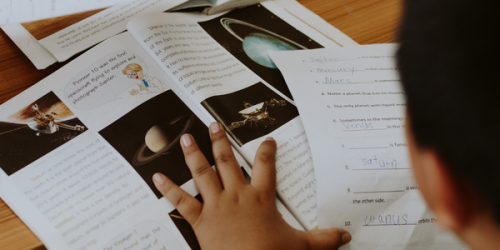(Read carefully; there is really a quiz at the end!)
We’ve all taken plenty of tests in our time—so surely any of us could figure out how to assess our students, right? Not so fast! Strong assessment practice requires training in how to design, implement, interpret, and use different forms of assessment and data.
A few fun facts about how assessments can help student learning:
- A good assessment can help students understand what content and skills are most important and how to organize the content they learn. Open-ended or written response questions, especially, can promote a deeper understanding by making students organize their own thoughts.
- The “testing effect”—in which assessing someone on material in the short-term helps promote long-term retention—has been long documented. This effect can even help us remember related material that isn’t on the test!
- Reviewing assessment data can be powerful for both students and their teachers. For students, reviewing their own data helps them be active in their own learning. For teachers, assessment data tells them how student learning is progressing and what misunderstandings they need to address. Of course, teachers need training in how to do this well.
Assessment is complex and varied, not just a bogeyman of standardized tests for accountability purposes (though, we here at NCTQ think those can be crucial for ensuring quality and equity). Assessments can include questions posed by the teacher in class, written responses, homework assignments, quizzes, and—of course—tests, all with the purpose of determining what students have learned, what they still need to learn, and where they have misconceptions or gaps in their understanding.
Training in assessment methods is therefore nothing short of essential to teacher preparation. Poor assessment practices can both yield meaningless data and confuse students. For example, studies have found that multiple choice questions can be a big problem if teachers do not give timely and thorough feedback to correct student mistakes. Without feedback, students can actually “learn” false knowledge as they remember the incorrect answers they chose for multiple choice assessment questions. Fortunately, even limited professional development in assessment design and data use can improve student outcomes.
What does quality training in assessment look like—and are prep programs doing it?
- Teacher candidates should learn about the instructional role of standardized tests.
- Teacher candidates should practice developing multiple forms of both formative and summative assessments—and understand the varying purposes these assessments serve.
- Teacher candidates should practice analyzing both their own classroom assessment data and state standardized assessment data, and plan future instruction based on that analysis.
Source: NCTQ 2014 Teacher Prep Review, Standard 12: Assessment and Data.
So, are you ready for the quiz? Click here to assess your knowledge of why teacher candidates should be trained in assessment. (Be sure to review the feedback!) And check out our Teacher Prep Review Standards for more on research-based best practices in teacher training.
More like this

Gambling with children’s futures—and no one’s tracking whether we win or lose

Teacher Prep Review: Building Content Knowledge

What do NASA scientists, historians, and strong readers have in common? Content knowledge

